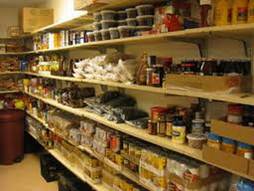Food Pantries
Food pantries are located in the community, typically in churches, community centers, and senior centers, and they provide free food to those who have a verified need (e.g., on Medicaid or supported by the Department of Transitional Assistance [DTA]). There are usually restrictions on the frequency of use by a family. Most of the food is provided by a food bank, and there are guidelines regarding nutritional quality; most do not accept "junk" food
Find a Food Pantry: http://www.foodpantries.org/
The Boston Medical Center Preventive Pantry
 Families can visit the BMC food pantry twice per month and receive 3-4 days worth of food for their household each time. The BMC food pantry also provides perishable goods, such as fruits, vegetables and meats all year round. These are costly items, and often lacking in a low-income family's diet. In 2011, the Preventive Food Pantry served over 6,700 patients and their families each month.
Families can visit the BMC food pantry twice per month and receive 3-4 days worth of food for their household each time. The BMC food pantry also provides perishable goods, such as fruits, vegetables and meats all year round. These are costly items, and often lacking in a low-income family's diet. In 2011, the Preventive Food Pantry served over 6,700 patients and their families each month.
This is also a therapeutic food pantry. If needed, food is provided that is appropriate for someone on a special diet. For example, patients with diabetes will be provided a carbohydrate controlled diet. A prescription from a physician is needed for a patient to receive food from the pantry. The Pantry Manager is a Registered Dietetic Technician, and is qualified to determine what foods are appropriate for specific therapeutic diets.
The BMC food pantry also has a Demonstration Kitchen, run by a Chef/Registered Dietitian. The Demonstration Kitchen educates patients on ways to prepare foods that will complement the therapeutic diet as prescribed by their physician.
To learn more visit: http://www.bmc.org/nutritionresourcecenter/foodpantry.htm